| Listing 1 - 10 of 17 | << page >> |
Sort by
|
Book
ISBN: 0710064136 Year: 1969 Publisher: London Routledge & Kegan
Abstract | Keywords | Export | Availability | Bookmark
 Loading...
Loading...Choose an application
- Reference Manager
- EndNote
- RefWorks (Direct export to RefWorks)
Theory of knowledge --- Perception --- Théorie de la connaissance
Book
ISBN: 0631127658 Year: 1981 Publisher: Oxford : Blackwell,
Abstract | Keywords | Export | Availability | Bookmark
 Loading...
Loading...Choose an application
- Reference Manager
- EndNote
- RefWorks (Direct export to RefWorks)
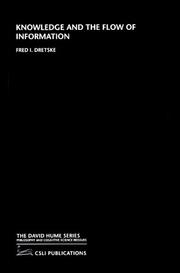
ISBN: 157586195X 9781575861951 Year: 1999 Publisher: Cambridge (Mass.): Cambridge university press,
Abstract | Keywords | Export | Availability | Bookmark
 Loading...
Loading...Choose an application
- Reference Manager
- EndNote
- RefWorks (Direct export to RefWorks)
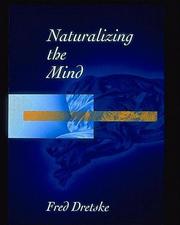
ISBN: 0262041499 0262271974 0585003033 9780585003030 9780262271974 9780262041492 Year: 1995 Publisher: Cambridge (Mass.) : MIT press,
Abstract | Keywords | Export | Availability | Bookmark
 Loading...
Loading...Choose an application
- Reference Manager
- EndNote
- RefWorks (Direct export to RefWorks)
Naturalizing the Mind skillfully develops a representational theory of the qualitative, the phenomenal, the what-it-is-like aspects of the mind that have defied traditional forms of naturalism. Central to Dretske's approach is the claim that the phenomenal aspects of perceptual experiences are one and the same as external, real-world properties that experience represents objects as having. Combined with an evolutionary account of sensory representation, the result is a completely naturalistic account of phenomenal consciousness. Dretske's theory of naturalistic representationalism is perhaps the only approach to the study of consciousness that can satisfactorily pin down the slippery first-person aspect of our sensory and affective life. It distinguishes, in wholly naturalistic terms, between what we experience (reality) and how we experience it (appearance). The theory establishes a framework within which subjectivity can be studied objectively, explains the peculiar authority we enjoy about our own mental states, and provides a biologically plausible answer to questions about the function or purpose of consciousness.
Cognitive psychology --- Philosophical anthropology --- Theory of knowledge --- Philosophy of mind --- Mind, Philosophy of --- Mind, Theory of --- Theory of mind --- Philosophy --- Cognitive science --- Metaphysics --- Philosophy of mind.
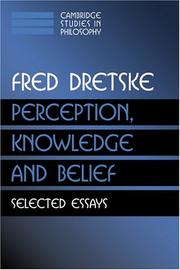
ISBN: 0521771811 0521777429 0511625316 9780521777421 9780521771818 9780511625312 Year: 2000 Publisher: Cambridge: Cambridge university press,
Abstract | Keywords | Export | Availability | Bookmark
 Loading...
Loading...Choose an application
- Reference Manager
- EndNote
- RefWorks (Direct export to RefWorks)
This collection of essays by eminent philosopher Fred Dretske brings together work on the theory of knowledge and philosophy of mind spanning thirty years. The two areas combine to lay the groundwork for a naturalistic philosophy of mind. The fifteen essays focus on perception, knowledge, and consciousness. Together, they show the interconnectedness of Dretske's work in epistemology and his more contemporary ideas on philosophy of mind, shedding light on the links which can be made between the two. The first section of the book argues the point that knowledge consists of beliefs with the right objective connection to facts; two essays discuss this conception of knowledge's implications for naturalism. The next section articulates a view of perception, attempting to distinguish conceptual states from phenomenal states. A naturalized philosophy of mind, and thus a naturalized epistemology, is articulated in the third section. This collection will be a valuable resource for a wide range of philosophers and their students, and will also be of interest to cognitive scientists, psychologists, and philosophers of biology.
Knowledge, Theory of. --- Philosophy of mind. --- Knowledge, Theory of --- Philosophy of mind --- Mind, Philosophy of --- Mind, Theory of --- Theory of mind --- Philosophy --- Cognitive science --- Metaphysics --- Philosophical anthropology --- Epistemology --- Theory of knowledge --- Psychology --- Arts and Humanities
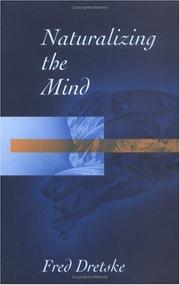
ISBN: 0262540894 9780262540896 Year: 1999 Volume: 1995 Publisher: Cambridge (Mass.): MIT Press,
Abstract | Keywords | Export | Availability | Bookmark
 Loading...
Loading...Choose an application
- Reference Manager
- EndNote
- RefWorks (Direct export to RefWorks)
Cognitive psychology --- Philosophical anthropology --- Theory of knowledge
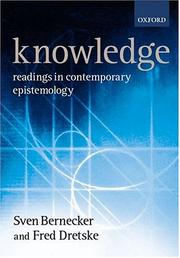
ISBN: 019875261X 9780198752615 Year: 2006 Publisher: Oxford Oxford University Press
Abstract | Keywords | Export | Availability | Bookmark
 Loading...
Loading...Choose an application
- Reference Manager
- EndNote
- RefWorks (Direct export to RefWorks)
Theory of knowledge --- Knowledge, Theory of. --- Knowledge, Theory of --- Epistemology --- Philosophy --- Psychology
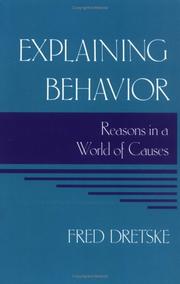
ISBN: 0262271966 0585020523 0262540614 0262040948 9780585020525 9780262271967 9780262040945 9780262540612 Year: 1988 Publisher: Cambridge (Mass.) : MIT press,
Abstract | Keywords | Export | Availability | Bookmark
 Loading...
Loading...Choose an application
- Reference Manager
- EndNote
- RefWorks (Direct export to RefWorks)
Psychology --- Human behavior --- Causation --- Social Sciences --- Philosophy --- Causality --- Cause and effect --- Effect and cause --- Final cause --- Action, Human --- Behavior, Human --- Ethology --- Human action --- Human beings --- Behavior --- Human behavior. --- Causation. --- Explanation. --- Philosophy. --- Human biology --- Physical anthropology --- Social sciences --- Psychology, Comparative --- Beginning --- God --- Metaphysics --- Necessity (Philosophy) --- Teleology --- Psychologie --- Comportement humain --- Causalité --- Philosophie --- Psychology - Philosophy.
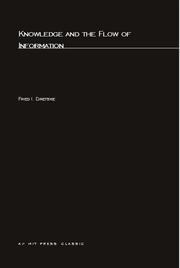
ISBN: 026254038X Year: 1982 Publisher: Cambridge (Mass.) : MIT press,
Abstract | Keywords | Export | Availability | Bookmark
 Loading...
Loading...Choose an application
- Reference Manager
- EndNote
- RefWorks (Direct export to RefWorks)
Book
ISBN: 0710062133 Year: 1969 Publisher: London : Routledge and Kegan Paul,
Abstract | Keywords | Export | Availability | Bookmark
 Loading...
Loading...Choose an application
- Reference Manager
- EndNote
- RefWorks (Direct export to RefWorks)
| Listing 1 - 10 of 17 | << page >> |
Sort by
|

 Search
Search Feedback
Feedback About UniCat
About UniCat  Help
Help News
News